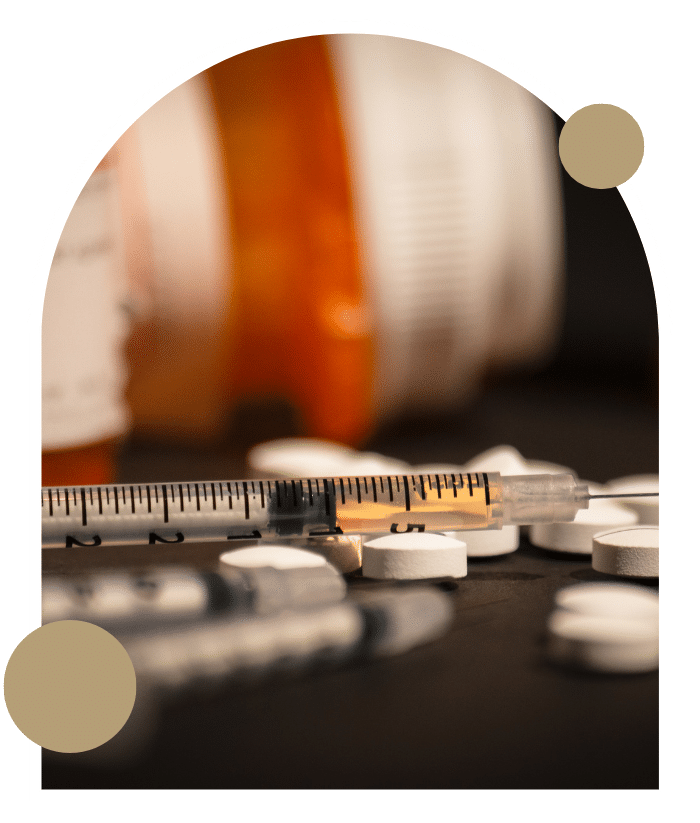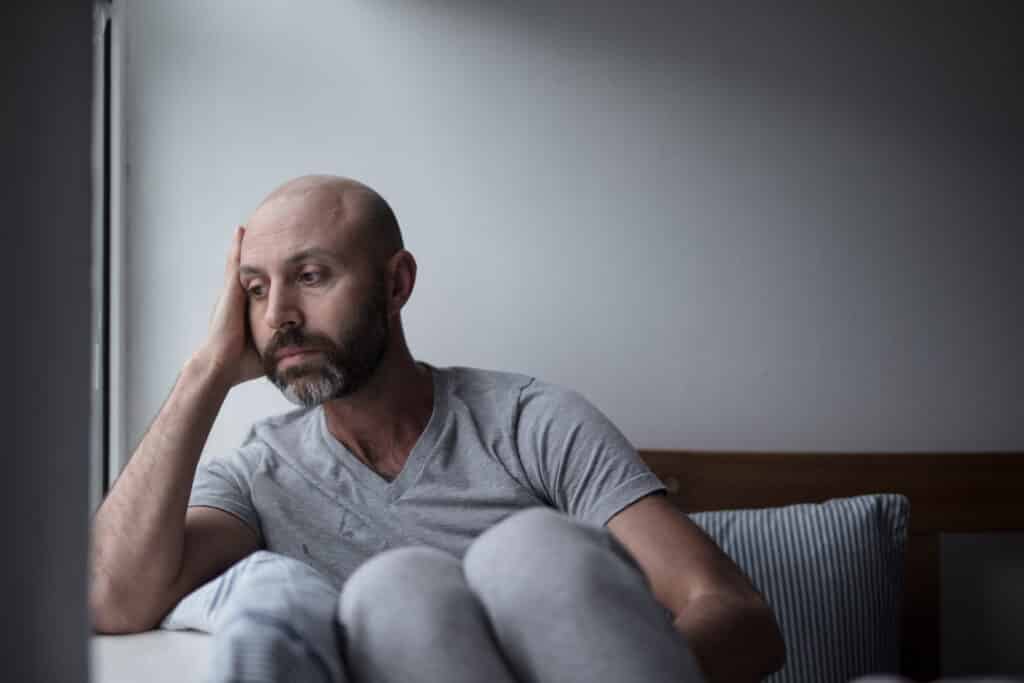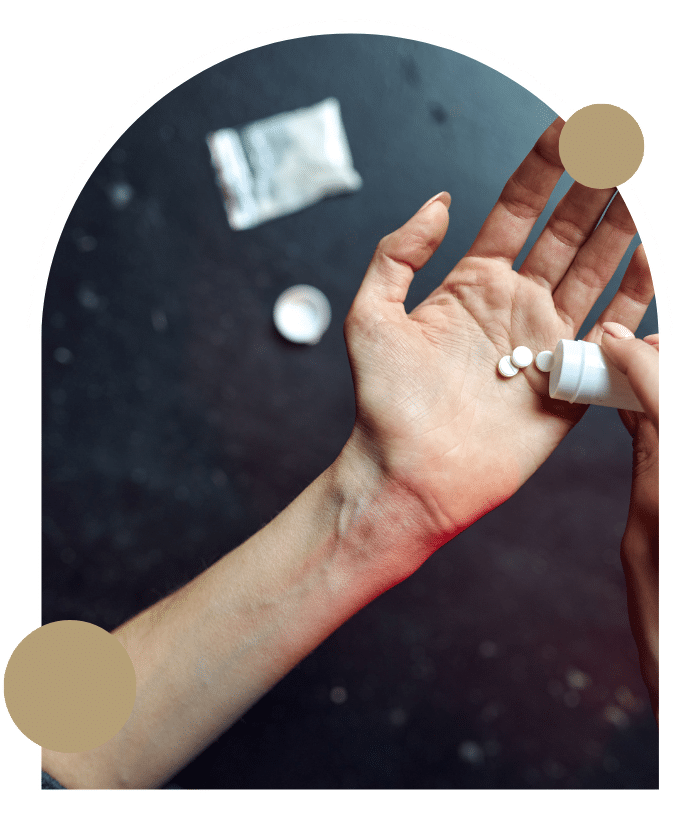

When people think of an opioid addiction, they generally think of street drugs like heroin or fentanyl. However, it’s also possible to develop an addiction to prescription opioid medications such as oxycodone, hydrocodone, morphine or codeine. Opioids are a significant problem for our nation, killing more than 80,000 Americans every year. Of this number, roughly 88 percent of deaths are from synthetic opioids.
NJ Recovery Solutions is experienced in treating opioid addictions. We recognize that overcoming opioid dependence is difficult, but there are multiple treatment options available. Between medication, counseling and therapy, it is possible to make a full recovery. Our team is here to walk the road with you – bumps and all.
Opioids are a class of drugs naturally found in the opium poppy plant. Some prescription opioids are made from the plant directly, and others are synthesized by scientists in labs using the same chemical structure. Opioids are commonly prescribed by doctors to treat moderate to severe pain but have the potential to be used improperly, leading to addiction, overdose incidents, and even death.
Opioids include a range of substances; from legal prescription medications like morphine, codeine, oxycodone (OxyContin), and hydrocodone (Vicodin), to the illegal drug heroin, as well as synthetic opioids such as fentanyl. The power of opioids lies in their ability to relax the body and alleviate pain. However, they also produce a sense of euphoria or “high,” which can lead to misuse and addiction.
Opioid addiction has become a critical public health issue, particularly in the United States, where it has been labeled as an epidemic due to the high rates of drug use and associated overdoses. Here are some significant statistics that highlight the severity of this crisis:
The opioid epidemic requires a coordinated response involving improved prescribing practices, better addiction treatment programs, more comprehensive recovery support, and broader public education to raise awareness about the dangers of opioid misuse. Understanding the risks associated with opioid use and recognizing the signs of addiction are crucial steps in tackling this devastating public health issue.
At our center, we are committed to providing resources and support to individuals and families affected by opioid addiction. By offering comprehensive treatment options and working to increase awareness and understanding, we aim to reduce the impact of opioid abuse in our community and help those in need find a path to recovery.
While anyone can become addicted to opioids, researchers believe that a combination of genetic and environmental factors influence a person’s risk. For those who believe that they may have a genetic predisposition to developing an addiction, it’s best to use opioids wisely and safely, and explore alternatives for pain management.
The signs and symptoms that a person may be struggling with an opioid addiction are:









Anyone who takes opioids can become addicted to them. While opioids do have their place in medicine, they are also highly addictive, which is why they should only be used for short-term needs. Taking opioids without a prescription or in a way that is different from what’s prescribed (taking more frequently, taking higher doses) is abuse.
When a person takes opioids, they trigger the release of feel-good endorphins in the brain. This is what produces pleasurable effects like relaxation and euphoria. When this feeling wears off, the brain naturally wants this feeling again as soon as possible. This is the first potential step towards addiction.
Over time, the body grows tolerant and needs more of the drug to achieve the same effects. Since doctors are aware of the risks of opioids, it’s difficult to get them to increase a dose or renew a prescription. As a result, some people turn to illegally obtained opioids or heroin. Prescription opioid abuse is a known risk factor for heroin use.

At NJ Recovery Solutions, we are deeply committed to providing effective and compassionate treatment for individuals struggling with opioid addiction. Recognizing the complexity of opioid dependency, our treatment programs are designed to address all aspects of addiction—physical, psychological, and emotional. Here’s an overview of our comprehensive approach to treating opioid addiction:
The first step in overcoming opioid addiction is often detoxification. At NJ Recovery Solutions, we work with a number of detox partners that offer medically supervised detox to manage withdrawal symptoms safely and comfortably. Under the constant care of medical professionals, patients are monitored 24/7 to mitigate the physical challenges associated with opioid withdrawal, which can include severe pain, gastrointestinal distress, and intense cravings.
Understanding that each person’s journey to recovery is unique, we create personalized treatment plans for all our clients. These plans are tailored to meet individual needs, taking into account the severity of the addiction, any co-occurring mental health conditions, and the patient’s personal recovery goals. Our approach integrates various therapeutic modalities to ensure comprehensive care.
Our treatment programs utilize a range of evidence-based therapies proven effective in treating opioid addiction, including:
Recovery from opioid addiction can be profoundly enhanced by the support of peers facing similar challenges. Our group therapy sessions provide a platform for shared experiences, emotional support, and further education about addiction. These groups help build a community of support, crucial for maintaining long-term sobriety.
Addiction impacts not just the individual but their entire family. Our family therapy programs involve loved ones in the recovery process, helping to heal relationships and establish a supportive home environment. This therapy also educates families on the dynamics of addiction and how to best support their loved one’s journey to recovery.
Successful treatment of opioid addiction requires ongoing support even after the initial treatment phase. NJ Recovery Solutions provides comprehensive aftercare programs designed to prevent relapse. These include continued therapy sessions, support groups, and access to community resources. Our aftercare plans are personalized, adapting to each patient’s evolving needs as they transition back into daily life.
We believe in you. It’s time to believe in yourself. Contact NJ Recovery Solutions to learn more about our comprehensive and personalized approach to treating crystal meth addiction and how we can start you on the path to healing.
At NJ Recovery Solutions, we are committed to helping individuals overcome opioid addiction and reclaim their lives. Our team of dedicated professionals offers the support, care, and expertise needed to navigate the path to recovery. If you or a loved one is struggling with opioid addiction, we invite you to reach out to us today. Together, we can work towards a healthier, substance-free future.
Opioid addiction is treatable. People recover from opioid addiction every day and go on to do great things with their lives. You can, too! To learn more about NJ Recovery Solutions and our comprehensive, personalized approach to treating opioid addiction, contact our admissions team today.
NJ Recovery Solutions offers a range of treatment programs tailored to the specific needs of individuals struggling with opioid addiction. These include medically supervised detoxification to safely manage withdrawal symptoms, inpatient residential treatment for comprehensive care and support, outpatient programs that allow for recovery while maintaining daily responsibilities, and medication-assisted treatment (MAT) to help manage cravings and reduce the risk of relapse.
Each treatment plan at NJ Recovery Solutions is personalized based on a thorough initial assessment of the individual’s medical history, severity of addiction, co-occurring mental health conditions, and personal recovery goals. Our team of specialists considers all these factors to create a holistic treatment plan that integrates appropriate therapies, support systems, and medical interventions.
MAT is a critical component of our opioid addiction treatment program. We use FDA-approved medications such as buprenorphine, methadone, and naltrexone to help reduce opioid cravings and withdrawal symptoms, making it an effective tool for preventing relapse. MAT is combined with comprehensive behavioral therapies to address the psychological aspects of addiction, ensuring a well-rounded approach to recovery.
Yes, family involvement is strongly encouraged as it plays a vital role in the recovery process. NJ Recovery Solutions offers family therapy sessions designed to repair and strengthen relationships affected by addiction. These sessions also provide education on addiction and how family members can best support their loved one’s journey to recovery, creating a supportive environment that promotes long-term sobriety.
Recognizing that recovery is an ongoing process, NJ Recovery Solutions provides extensive aftercare and support services to help individuals maintain their sobriety after completing the initial treatment program. This includes access to support groups, ongoing counseling, and relapse prevention education. We also help connect individuals with community resources and recovery networks to ensure they have a robust support system in place.